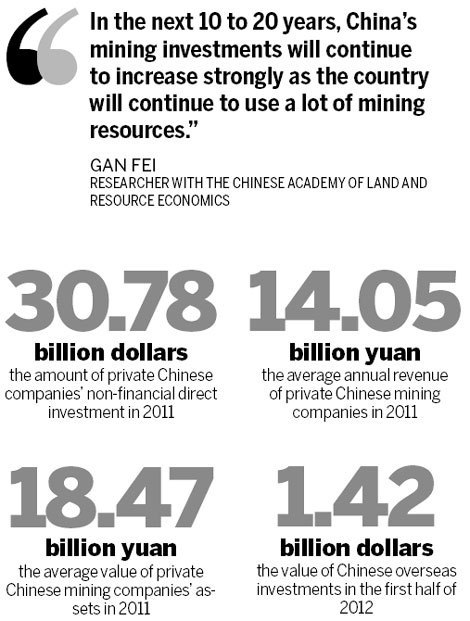Private firms eye overseas mining sector
Updated: 2012-11-06 09:45Growing investments
Private Chinese companies have three main means of investing in the overseas mining industry: exploring mines directly, pursuing mergers and acquisitions, and providing outsourcing services.
Xiangguang Copper Co Ltd, a privately owned copper smelting, refining and processing group based in Shandong province, announced plans in February to acquire a 10 percent stake in Spain's EMED Mining Co Ltd for $15 million.
Rongtai International Group Holdings Ltd, a steel trader and shipping company in Fujian province, bought eight iron ore mines in Australia in August, enabling steel mills in the province to use iron ore produced by a local company.
To save expenses on raw materials, the smelters and processing companies have been expanding into the upstream mining business.
During the first half of 2012, China made 64 mining investments, involving $1.42 billion, in 32 countries. The projects pertained to coal and metals, said Chen Xianda, vice-chairman of the China Mining Association.
"Overseas mining investment in the first half of this year has been slowing down," he said. "In the mining sector, China's investments in Australia have been reduced while the country's investments in Latin America have been increasing."
China's private investments in the overseas mining industry have been welcomed as the global economy continues to recover, Yang said.
And international investment is slowing down because of the global financial crisis, opening opportunities to private capital in China.
The Chinese government has meanwhile carried out a series of policies to encourage private capital to invest in the resources-mining industry.
The Ministry of Land and Resources, together with the All-China Federation of Industry and Commerce, has published instructions that call for private capital to be invested in the resources industry, encouraging private investors to participate in the exploration for non-conventional sources of oil and gas.
Gan said the policies have made it easier for private capital to enter the resources market.
In recent decades, various private Chinese companies have acquired experience and skill in resources exploration. They are capable of participating in the mining business at a higher level and on a larger scale.
The privately owned Jinan Yuxiao Group Co Ltd, formerly a real estate developer, applied in late October to establish five more mining subsidiaries in Mozambique, according to reports by the China Economic Herald.
Since establishing its business in the country in 2005, it has acquired seven mining rights and 60 exploration rights.
The company will start making profits by the end of the year from its investments in two nonferrous metals mines in Africa, said its chairman Wu Tao.
It also owns exploration rights in gold, iron ore and coal mines in Africa, as well as similar sorts of operations.
"We usually cooperate with listed companies or State-owned companies in the overseas mining businesses after we get exploration rights because those require huge capital investments in long-term exploration and mining abroad," Wu said.
Compared with Chinese State-owned companies, which have seen many failures in their attempts to make acquisitions in the overseas mining market, private companies are finding it easier to win approvals from foreign governments for energy and resources investments, experts said.
Experts, though, are also reminding private companies to do more to avoid risks when undertaking overseas mergers and acquisitions.
"They need to prepare detailed strategic plans and conduct enough preliminary research before reaching a formal contract," said Tong Junhu, general manager of China National Gold Group Corp's overseas development department.
Contact the writer at dujuan@chinadaily.com.cn
dujuan@chinadaily.com.cn

- BYD exports three electric cars to Thailand
- Grid gets first jolt of residential solar power
- US now largest buyer of China's exports
- China's outbound M&As on the rise
- Tobacco control may entail price, tax rises
- Quanzhou becomes pilot financial reform zone
- New automobiles shine at Geneva Motor Show
- World's longest high-speed rail 'on track'
- Jiugui Liquor involved in plasticizer scandal again
- Accident reignites school bus safety concerns
- China to revise labor law
- Trademark registration under scrutiny
- Dinner ban takes toll on liquor firms
- CIC tables bid for London's Chiswick Park
- Property buyers eye overseas market
- Call for law to protect personal information
- China to cut train ticket prices
- Christmas business
- Solar industry to get jolt from new policies
- KFC chicken under spotlight















